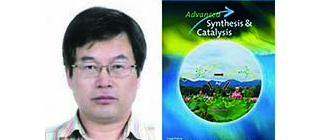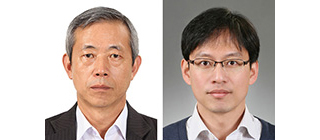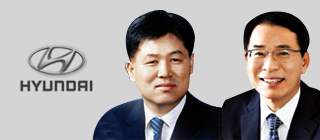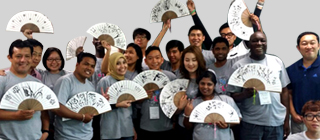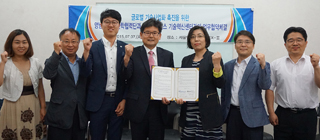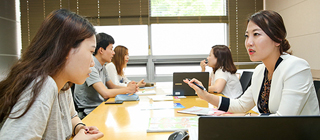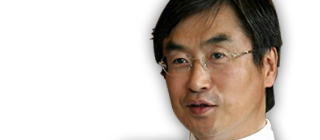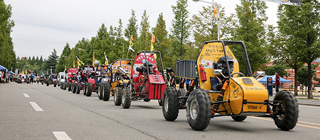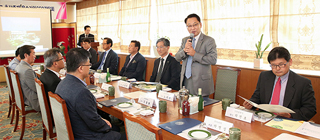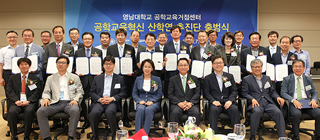-
Three theses published in 2015 selected as poster paper for authoritative international academic journals Development of safe, economic and eco-friendly organic response methods Can be utilized in manufacturing various everyday products such as pharmaceuticals, electronic materials and perfumes [August 24, 2015] <A study recently published by Professor Lee Yong-rok was selected as the poster paper of a world acclaimed journal in the applied chemistry field> Three papers that Professor of Chemistry Lee Yong-rok (56) recently published were all selected as poster papers for authoritative international academic journals. The study ‘Construction of Various Types of Azopyrazole Cyclic Compounds using Silver Catalysts’ by Professor Lee, a leader in the organic compound field, was selected as the front page paper (photo above) and VIP study in the latest issue (August) of <Advanced Synthesis & Catalysis (Impact Factor 5.663)>, which is in the top 1.4% of the applied chemistry field. In May, his papers such as ‘New Synthesis of Iron-Palladium Bimetal Nano-Catalysis and Application in Cyclic Reaction’ and ‘Synthesis of Anthraquinone and Tetrasendion of Various Forms using Organic Catalysts’ were selected as the end poster paper of <Catalysis Science &Technology, IF=5.426,> (bottom left) and <Chemical Communications, IF=6.834> (bottom right), respectively. Through research, Professor Lee developed new organic reaction techniques that were never reported in the past using various types of catalysts. It has been assessed that through such organic reaction methods, physiological activities and functional compounds were easily and simply synthesized. Professor Lee said, “The developed compounding method can be used safely using catalysts that can be easily purchased, and furthermore, because it is environment friendly and economical, it can be used widely in precision chemical product manufacturing such as new pharmaceuticals, electronic materials, dyes, and perfumes, so it is expected to contribute to national industries and economical development.” He said, “I would like to turn this honor to the graduate school students from Nepal, China, Vietnam and India who diligently participated in this study” as he expressed his gratitude. He also announced his plans to continue working in organic compound research such as pursuing joint research with other institutes to develop new drugs and electronic materials. Professor lee, who was appointed as a professor of the YU School of Chemical Engineering in September 1995 published over 200 studies in SCI journals by conducting research on new physiological activation materials and functional organic molecular synthesis. He has also registered 36 patents. He has been actively engaged in research and in just the past two years, he published 50 papers in acclaimed international academic journals such as <Organic Letters, IF=6364>, the most authoritative academic journal in the organic chemicals sector published by the American Chemistry Association, and <Green Chemistry, IF=8.02> published by the British Chemistry Association. For his efforts, he was awarded the Academic Progress Award by the Korean Chemistry Association in 2008, and was selected as the best reviewer for two straight years in 213 and 2014 from <Tetrahedron>, an acclaimed academic journal in organic chemistry by Elsevier, the world’s largest publisher of academic journals. In <Noteworthy Chemistry> published by the American Chemistry Association in 2014, Professor Lee’s research was introduced in detail. Last year, he was selected as an excellent evaluator of the basic research projects of the National Research Foundation and he has also been continuously active as a judge for the world college evaluations by Britain’s college evaluation institute, QS. He is currently participating in the National Research Foundation’s Junior Researcher Support Project, Nano-Material Technology Development Project, and the Focus Research Center Projects. This study was carried out as part of this project.
-
Professor Lee Jong-wook awarded the Gwangjeong Zoology Award for discovering 600 unrecorded and new organisms and for his contributions in zoology Professor Seok Ho-young received ‘Presidential Citation’ for contributions to the development of the nation and society through environmental conservation activities [August 11, 2015] <School of Biotechnology Professors Lee Jong-wook (left) and Seok Ho-young> Professors of the YU School of Biotechnology made great achievements by winning an academic award and presidential citation. Professor Lee Jong-wook (6) won the Gwanjeong Zoology Award. The Gwanjeong Zoology Award was founded with investments made by the family of the late Gwanjeong Cho Bok-seong, who was a pioneer of Korean biology, to remember his academic spirit and achievements. This is an academic award given to scholars with excellent research achievements in the zoology field every two years from 1980. This is the 18th awards this year. Professor Lee Jong-wook has been actively engaged in research for over 40 years with over 200 research papers in the biology field being published in prominent domestic and international academic journals. He found over 600 species of unrecorded and new organisms, and thus received the Gwanjeong Zoology Award in recognition of his contributions to the development of Korean zoology. After earning his PhD in zoology at Korea University, Professor Lee has been serving as a professor at YU from March 1986. He served as the dean at the YU Department of Biology, researcher at the American Entomological Institute (AEI), director at the Korean Society of Applied Entomology, and member of the Gyeongsangbuk-do Cultural Heritage Committee. He is also active as an auditor for the Entomological Society of Korea, director of the Korean Society of Zoology, operating committee member of the Korean Biodiversity Association, and editor of the Insecta Koreana Compilation Committee. Prior to this in July, Professor Seok Ho-young (45) was awarded a presidential citation for his contribution to national development through environmental conservation activities at the National Nakdong River Bio Resources Center opening ceremony held in Sangju. Professor Seok Ho-young has contributed greatly in establishing research technologies related to national bio resource preservation and diversity identification. Professor Seok has been participating as a researcher in research projects on the conservation and diversity of bio resources carried out by the National Bio Resource Center since 2011 such as research on systems of major fish resources, analytical research on genetic diversity of bio resources, and drafting wild invertebrates in the Korean Peninsula and barcode DNA analysis. In particular, he contributed to the establishment of the National Nakdong River Bio Resource Center by providing basic consulting and his activities as committee members of the Nakdong River Bio Resource Center from 2011 to 2014. He also provided consultations for the National Bio Resource Center, Korea Rural Community Corporation, National Fisheries Research & Development Institute, Cultural Heritage Administration, and other institutes under the Ministry of Environment as a consultant for government and research institutes. In 2009 and 2013, also participated in the Unmunsan Natural Scenery Preservation Area selection ecological survey project led by the Daegu Provincial Environmental Office, as well as its follow-up monitoring project, as he actively participated in regional ecological protection projects. After earning his PhD at the Seoul National University Department of Bio Sciences, Professor Seok worked as a researcher at the University of Western Ontario and University of Toronto, and then at Johns Hopkins Medicine in the US before being appointed as a professor at YU in March 2009.
-
Following Seoul National University, third place together with Yonsei University and Hanyang University Kang Hak-seo, CEO of Hyundai Steel and Jung Il-soo, CEO of Hyundai Powertech Sixth place for graduating CEOs among the top 100 companies in Korea [July 23, 20153] Universities of Hyundai Group CEOs University Major No. Percentage No. Percentage SNU 8 36.4% Engineering 10 45.5% Korea University 3 13.6% Business / Economy 8 36.4% Yonsei University 2 9.1% Law 1 4.5% Hanyang University 2 9.1% Social Science 1 YU 2 9.1% Humanities 1 4.5% Others 5 22.7% Others 1 4.5% Source: CEO Score / Units: persons YU (President Noh Seok-kyun) was ranked third place nationwide in the Hyundai Group CEO universities, which is the second largest conglomerate in Korea. CEO Score (CEO Park Joo-geun), a business performance evaluation site, announced the results of analyzing the universities from which the 22 CEOs of the 17 Hyundai Group CEOs. YU graduated two CEOs, becoming the university with the third most CEOs for Hyundai Group companies following Seoul National University (8) and Korea University (3). Yonsei University and Hanyang University also graduate two CEOs each, thus ranking hird place together with YU. Among the Hyundai Motor Group CEOs, those from YU are Kang Hak-seo (60, left0 and Hyundai Steel Jung Il-soo (57, right). Mr. Kang Hak-seo is from the Department of Business Administration class of 79 and served as the VP and CEO of Hyundai Rotem, then served as the VP of Hyundai Steel and was appointed as the CEO of Hyundai Steel in October of last year. Mr. Jung Il-soo was from the YU Department of Mechanical Engineering class of 76 and has been serving as the CEO of Hyundai Powertech since August 2013. Among the Hyundai Motor Group CEOs, those from YU are Kang Hak-seo (60, left0 and Hyundai Steel Jung Il-soo (57, right). Mr. Kang Hak-seo is from the Department of Business Administration class of 79 and served as the VP and CEO of Hyundai Rotem, then served as the VP of Hyundai Steel and was appointed as the CEO of Hyundai Steel in October of last year. Mr. Jung Il-soo was from the YU Department of Mechanical Engineering class of 76 and has been serving as the CEO of Hyundai Powertech since August 2013. Meanwhile, YU also placed sixth place in the CEO graduating universities of the top 100 companies in Korea according to analysis and presentation made by the April issue of <Modern Management>. In the ‘KOSDAQ listed CEO status’ of KOSDAQ, YU also ranked sixth place for 2013 and 2014, reconfirming the alumni power of YU that is leading the Korean financial sector.
-
Public Officials of Emerging Countries Learn Korean Language and Culture at YU Consigned by KOICA study program, public officials from seven countries to study for eight weeks until September 6 Hangeul education, special lecture on Korean politics, economics, society and history, field trip to historical sites and company sites Various cultural experience education such as samul-nori, calligraphy, wearing Korean costumes, cooking classes [July 21, 2015] <Public officials from 7 countries learn Korean at YU.> Public officials from emerging countries visited YU (President Noh Seok-kyun) to learn the Korean language and culture. Thirteen public officials from seven countries such as Nigeria, Laos, Mongolia, Vietnam Sri Lanka, Indonesia and Peru came to YU to learn the Korean language and Korean culture. This study program was made possible as the YU Korean Language Education Center (Director Jeon Jung-gi) was selected for the ‘Korean Language and Korean Culture Understanding’ project hosted by the Korea International Cooperation Agency (KOICA). This program, which started on the 13th, will continue for eight weeks until September 6. This study program was composed of Korean language education and also special lectures on Korean politics, economy, social systems and history, and offers various types of Korean culture experience education and field trip programs. Particularly, in the Korean language education included in this study program, studies learned the basic consonants and vowels, vocabulary and grammar, as well as writing text messages, introducing family members, presentations on hobbies and travels, as well as other various Hangeul writing and speaking projects in order to concentrate on practical Korean language education for using Korean as a foreigner. In addition to the education and special lectures held in classrooms, various experience activities and field trips to actually see and experience Korean culture is scheduled, gathering high anticipations from participants. In addition to experience-based education of the colorful traditional culture of Korea such as samul-nori, calligraphy, Korean cuisine classes, natural dyes, pottery, traditional archery, and wearing traditional Korean garments, they will also visit the famous sites of Korea such as the YU Folk Village, Gyeongju Yangdong Village, Cheomseongdae, Cheonmachong, and the Cheongdo Saemaul Undong Origin Memorial Hall. They will also visit companies and tourist attractions that will show Korea’s development such as Gumi Samsung Electronics, POSCO, Busan Dongbaek Island APEC House, and the Haeundae Aquarium. In the last week, the students will use the overall understanding of Korea that they learned through the program to make presentations on detailed actual plans that could be applied in their home countries and hold discussions. Nilam Putri, Dewant (37), a public employee of the Indonesian Bureau of Secretariat for Chairmanship said, “I participated in this study program because I wanted to have better exchange with Koreans living in Indonesia. It is my first visit to Korea, but I have been highly interested in the passion and lifestyle of Korea, which made great developments in a short period of time after independence from the colonial age that Indonesia also experience.” He added, “I hope to not only learn the Korean language and Korean culture through this program, but also, I will think about ways to apply Korean culture in Indonesia.” YU Korean Language Education Center Director (Professor of International Commerce) Jeon Jeong-gi, who is in charge of this program, said, “This program is very significant in that it is basic training to foster working-level public employees who plan and execute national policies into ‘Korea experts’. He added, ”As an international cooperation leading university, YU will continue to participate in such emerging country public employee fostering programs through various methods.“
-
Korea Technology Finance Corporation and Shinhan Bank agrees to provide technical evaluation, guarantee and financial consulting support Signed MOU with global technology transfer consulting institute Expected to accelerate overseas technical marketing and commercialization [July 20, 2015] <YU signs work MOU for financial support with KIBO and Shinhan Bank.> YU (President Noh Seok-kyun) is pushing forward with transferring the intellectual properties and outstanding technologies possessed by the university to companies, while also accelerating technological commercialization. On the 9th, the YU Industry Academic Cooperation Team (Director Park Jin-ho) signed a three-way work MOU with the Korea Technology Finance Corporation Daegu Office (Director Kwak Young-cheol) and Shinhan Bank Daegu-Gyeongbuk Headquarters (Director Sohn Hyun-taek) to provide support to faculty/student business starters and venture companies and family companies within the Industry Academic Cooperation Team. With this MOU, KIBO will provide support in ways of technical evaluation and guarantee for faculty and student business starters, and YU family companies, and Shinhan Bank is planning to provide financial consulting to them. Start-ups will receive support by each institute in relation to fund procurement and financial management, and it is thus expected that commercialization of the outstanding technologies possessed by the college will help activate student start-ups. Prior to this, the YU Industry Academic Cooperation Team signed an MOU with the Steinbeis Technology Innovation Center (CEO Lee Gi-wang) on the 7th. The Steinbeis Foundation is a world acclaimed technology support consulting institute that supports commercialization and enhances economic feasibility by transferring excellent technologies possessed by universities and research centers. It is comprised of over 1,000 centers around the world with a total of upwards of 6,000 experts. <YU signed a work MOU with ‘Steinbeis’, a world-famous technology transfer and commercialization consulting company.> With the signing of this agreement, the two institutes agreed to cooperate for finding cooperative partners and mediated technological transfers for the commercialization of the intellectual properties and technologies possessed by YU. In particular, through this MOU, YU has teamed up with a world famous technology transfer consulting institute, and it is expected that they will accelerate preemptive overseas technological marketing and commercialization for the outstanding technologies possessed by the university. YU is currently engaging in overseas technology transfer marketing for a number of technologies in the bio fields, and some technologies are already in the process of overseas technological transfers. YU Industrial Cooperation Team Director (Professor of Chemical Engineering) Park Jin-ho said, “This year, YU was selected for government funded projects, and it is pursuing technology transfer and commercialization such as signing MOUs with specialized institutes in different sectors.” He added, “The paradigm shift focusing on technological commercialization pursued by YU is the start of the creative economy and it will provide the growth engine for the economic development of Korea.” Meanwhile, YU was selected for the ‘College Creative Asset Commercialization Support Project’ hosted by the Ministry of Education and the National Research Foundation last May. YU made a consortium with Kyungpook National University and was ranked in the Daegu-Gangwon region for the industry-academic cooperation team innovative project sector, thus received over 2.3 billion won to pursue technology transfer and commercialization projects for three years.
-
Operate ‘Career/Employment Consulting Center’ Career/employment consulting, hiring information, application documents, interview consulting, etc Operate concentrated career and employment consulting customized to each department during the school year [July 22, 2015] <Students are receiving counseling from consultants at the ‘Mobile Career/Employment Consulting Center’.> The employment capacity strengthening program that YU (President Noh Seok-kyun) began offering for the summer vacation is receiving good responses from students. The YU Student Capacity Development Office is operating the ‘Mobile Career/Employment Consulting Center’ to help students set career paths fitting their aptitude and to help them land jobs. Counseling is offered at the Group Study Centers in the Main Library and Second Library, which are frequently visited by students, from 10 a.m. until 5 p.m. during the vacation period. Faculty and outside consultants specializing in employment are providing information and counseling for career paths and employment to students. They are providing career counseling and information on duties at work to younger students, while providing hiring information, employment counseling, application document clinics for resumes and cover letters, as well as interview information for different companies and mock interview programs for students preparing to find jobs. . This has been very popular among students. Over 300 students have visited the consulting center that started on the 1st, showing the higher than expected passion for employment. YU Senior in Mechanical Engineering Choi Gyeong-jae (24), who was recently selected as an intern for POSCO and will be working at POSCO as an intern for four weeks starting on the 27th said, “Counseling from the consulting center that ranged from writing resumes to preparing for interviews helped me greatly,” and added, “I will gain experience as an intern during vacation, and work hard during my last semester and land a job before I graduate.” It is expected that YU’s assertive employment program that goes to where students are instead of waiting for students to come will help in the early career development and strengthening of employment capacities. YU Student Capacity Development Office Director, Professor Kim Young-take (Mobile Information Communication Engineering) said, “It’s good for students to prepare to look for employment on their own, but by receiving assistance from experts, they will be able to make preparations more systematically and in detail.” He added, “As we are developing various programs to strengthen capacities of students and help them in landing their desired jobs, we hope that more students will take full advantage of such programs.” Meanwhile, YU is planning to operate the ‘Mobile Consulting Center’ until August 14. The school is also planning to operate the ‘Customized Concentrated Career/Employment Consulting’ throughout the semester to help students with employment. Employment consultants will be placed in each department to provide information for career paths and duties to younger students fitting to their major, while providing employment information and operating employment support programs to senior-level students.
-
Kimchi lactobacillus found to have excellent anti-virus effects for corona virus, etc First time in the world to investigate anti-virus effects of kimchi lactobacillus International collaborative research between Korea and Malaysia opens new possibilities to develop drugs using kimchi lactobacillus Distribution begins to respiratory disease patients in the Bundang area including the Bundang 21st Century Yonsei Hospital [July 7, 2015] A college research team in Korea announced research results stating that kimchi lactobacillus is effective for preventing and treating viral diseases such as the corona virus family, which includes MERS-CoV and influenza. The ‘Customized Medical Research Team’ (Director – School of Biotechnology Professor Park Yong-ha), a research institute under YU (President Noh Seok-kyun), announced that it became first in the world to prove that lactobacillus extracted from kimchi has vast preventive and treatment effect for corona virus, influenza virus and pathogenic bacteria diseases. It scientifically proved that kimchi is a health food that could protect the health of people around the world. The international collaborative consortium research team comprised of Professor Park Yong-ha, Professor 리옹 of USM University in Malaysia, the multi-national company ‘3M’, animal testing company ‘Teroka Jaya’, and the Korean company specializing in bacillus ‘Probionic’ carried out research on antibiotic feeds to substitute for livestock (chicken) of kimchi lactobacillus for the past year. In result, it was proven that the ‘Lactobacillus Sakei Probio 65’ host found in kimchi lactobacillus could replace the antibiotics in livestock feed involving disputes over the abuse of antibiotics. In addition, upon injecting the ‘Lactobaccillus Sakei Probio 65’ host in 2,000 mother pigs infected with the animal corona at a hog farm near the Daedeok Research Complex and at YU, it showed 100% recovery in clinical trials in just one week. When animals consume kimchi lactobacillus, lgA, an antibody in the blood, is secreted in the mucus membrane. Through this, the host is defended against attacks by viruses, while immuno-globulin G and gamma interferon is increased in the body, scientifically proving the mechanism that prevents infection by corona virus. <Kimchi Lactobacillus Anti-Corona Virus Activity> Type of Corona Virus: PED Corona Virus (PED-CoV) Cell Host: Vero cell separated from monkey kidneys Kimchi Lactobacillus: Lactobacillus sakei Cells infected with PED-CoV / Suppression of infection by L. Sakei Such research results were recently presented through a joint press conference of Professor Park and University Sains Malaysia (USM) Dean Osman, and reported by Malaysia’s national TV station, Malaysia 1 News and other media including the Malaysis Insider. Professor Park and the joint research team is planning to report parts of the research results at the ‘Asia Lactobacillus Conference’ that will be held in Bangkok, Thailand from the 8th to 11th of this month as well. On this, YU Customized Medical Research Team Director, Professor Park Yong-ha said, “These research results not only open up the possibilities of developing new drugs that can deal with corona virus and influenza, as well as immunity-related diseases such as atopy, but it will also contribute greatly in the globalization of kimchi as a health food.” He added, “We have already launched the product in early June through domestic bio companies and we are planning to distribute them to the world in the future. We are receiving a flood of orders from Japanese pharmaceutical companies.” *Comparative Experiment of Anti-bacterial Capacities of Probio Hosts - Displays excellent anti-bacterial effects (alternative antibiotic abiity) compared to foreign lactobacillus that have been commercialized These research results are receiving great attention from the domestic medical circles. Doctors in the Bundang area such as the 21st Century Yonsei Hospital in Bundang, Gyeonggi-do are expecting that the Lactobaccillus Sakei Probio 65 kimchi lactobacillus will be effective for preventing not only MERS, but also influenza, and began recommending kimchi lactobacillus to over 10 patients who frequently suffer from respiratory diseases since the end of June. Once the effects are verified, they are planning to begin full-fledged clinical studies. Meanwhile, Professor Park is an acclaimed authority on lactobacillus research for over 30 years, and reported ‘Lactobacillus kimchii’ for the first time in the world to the international academic circles to establish the position of Korea as the home of kimchi. He also teamed up with Professor Han Yoon-soo (Pediatrics) at Chungbuk National University and Probiotics (CEO Lee Hyun-joo) in an industry-academic cooperate research team to study the atopy immuno-disease treatment effects of kimchi microorganisms, and discovered the kimchi lactobacillus, ‘Lactobacillus Sakei Probio 65’ for the first time in the world. Upon applying on atopy diseases, it was found to effectively reduce cytokine that worsens immuno-diseases and improve it by over 238%, while publishing the mechanism through scientific clinical trials in an acclaimed international academic journal in 2010. He also published multiple research results stating that kimchi lactobacillus had excellent preventive and treatment effects of PED corona virus that causes epidemic diarrhea in hogs. Professor Park completed registration of international patents for such kimchi lactobacillus and received approval by the Ministry of Food and Drug Safety in 2013 as an individually recognized health functional food ingredient for the Lactobacillus Sakei Probio 65. Professor Park said, “Lactobacillus Sakei Probio 65 extracted from kimchi has the broadest anti-corona virus, anti-influenza, and anti-pathogenic bacteria effects than any other lactobacillus discovered, and its immuno-improvement effects were also proven through multiple tests.” He added, “Our country will play a leading role in the development of new drugs for preventing and treating various diseases such as corona virus diseases such as SARS and MERS, influenza, as well as immuno-diseases such as atopy.”
-
From 16th to 18th at YU Gyeongsan Campus, 38 teams fro m26 universities compete fiercely Overall best goes to KOREATECH ‘Ja.Yeon.In.’ Team, YU teams take 2nd and 3rd places [July 18, 2015] <2015 Baja SAE Participant Car Parade> The race to dreams, ‘Baja SAE KOREA at Yeungnam University 2015’ completed its three days of excitement and held its finale on the 18th. In this tournament, which celebrated its 20th anniversary this year, ‘Ja.Yeon.In’ Team of KOREATECH took first place to receive the Minister of Trade, Industry and Energy Award, trophy, winner’s flag and a cash prize of 3 million won. 2nd place when to the ‘YUSAE’ team of YU and the YU ‘CMDM A’ team. The ‘YUSAE’ and ‘CMDM' teams of YU took first and second place in the 2014 tournament, and thus placed in the top three for the second straight year to show that they are powerhouses in vehicle building tournaments. For each sector ’Team Miracle’ of Hanbat University and ‘Speeding B’ team of Keimyung University took the durability awards, YU ‘CMDM Bteam’ took the acceleration award, ‘Team Exponential’ of Ulsan University took the rock-climbing award, and ‘Baqu4’ of Hanyang University took the mobility award. <KOREATECH ‘Ja.Yeon.In’ Team – Grand Prize> 38 teams from 26 universities including KOREATECH and Hanyang University participated in Baja SAE 2015 that was held at the YU Gyeongsan Campus from the 16th to 18th to compete fiercely. Team leader Lee Won-min (24, Mechanical Engineering, junior) of the Chungnam National University ‘Four Wheels Team’ said, “This is already my third time participating since I was a freshman. The level of participants continuously improve every year and so I learn a lot after the tournament ends.” He added, “Despite this having excellent race tracks and infrastructure compared to any other tournament, it’s disappointing that there are not more participating universities. I hope that next year, more students will participate so that this can be a festival for us to see and learn more.” The participants who parked the vehicles that they built with their own hands at the designated parking lot on the 15th registered at 8 a.m. on the 16th at 8 a.m. and began static tests that included vehicle design creativity, structural stability, driver convenience, ease of maintenance, and mass-productivity, followed by basic control inspections and rule meetings until late in the evening. At 9 a.m. on the 17th, they held the official opening ceremony with the attendance of all participating teams, volunteers and sponsoring institutes at the main field and began a car parade of participating teams at the main field and streets around the school. In the afternoon, the dynamic test was held to measure acceleration, max speed, towing power, rock climbing, and passing mud waters. On the 18th, durability tests, which was the highlight of the tournament, was held on a 3.2km off-road track at the hill behind the YU water purification center. Professor Hwang Pyeong (Mechanical Engineering), the chairman of the competition who has been responsible for operation of the tournament for 20 years, said, “Students worked hard from design and production of their vehicles for about a year to participate in the tournament,” and added, “The theories they learned in class and field experience through this tournament will be valuable assets to students.” ‘Baja SAE Korea’ is a tournament for students to compete with vehicles they build ground-up and began in 1996. It received approval for the first time in Korea by the US SAE (Society of Automobile Engineers) in 2001 and became an international competition being held annually at YU. Results of the competition are published to the entire world through the SAE official homepage (www.sae.org) and publications.
-
Held CEO luncheon by inviting outstanding companies in the region Companies request excellent human resources with expertise Pursuing various industry-academic cooperation such as employment-linked field work, joint research-technical support, and retraining of current employees [July 16, 2015] <YU President Noh Seok-kyun holds meeting by inviting CEOs of outstanding companies in the region.> YU President Noh Seok-kyun is working hard to support employment of students and to strengthen industry-academic cooperation. YU President Noh Seok-kyun held a meeting by inviting CEOs of outstanding companies in the region at the Saint Western Hotel of Daegu on the 15th. The goal is to construct an industry-academic cooperative system for the mutual development of the university and companies. This was planned to expand the understanding on fostering human resources and industry-academic cooperation between universities and companies, and for universities to understand the human resource fostering and industry-academic cooperation method required by companies, and to reflect them in the major policies of the university in the future. YU is planning to pursue practical industry-academic programs such as fostering excellent human resources, promoting employment, internship programs, and constructing industry-academic clusters by industry through the continuous networking with regional small and medium sized companies. At this meeting were present YU President Noh Seok-kyun, Student Capacity Development Office Director Kim Young-tak, Industry-academy Cooperation Team Director Park Jin-ho, and Corporate Support Center Director Kim Seung-cheol, as well as CEOs from 10 outstanding small and medium sized companies of the region such as Kim Gyeong-jae of Nicca Korea, Choi Woo-seok of Daesung Hitech, Hong Byung-jin of Data Bank Systems, Lee Jung-ho of Seshin Precision, Kim Gwang-hyeon of Avaco, Park Myeong-seob of Avatec, Kim Chang-ho of Ajin Xtek, Kang Young-cheol of SSLM, Choo Gyo-hwan of Wini Tech, and Lee Young-jin of Taeyang Electronics. Daesung Hitech CEO Choi Woo-gak said, “It is important, but difficult to procure outstanding human resources for small and medium sized companies,” adding, “It would be great if universities and companies could continuously cooperate to work together to foster excellent human resources.” Nicca Korea CEO Kim Gyeong-jae said, “We are always in need of master’s or PhD-level researchers with expertise. I hope that the university will show a lot of interest in this and work hard to foster specialized researchers.” Likewise, the CEOs of participating companies all stated that the role of the university to foster human resources with expertise in various fields is crucial. In response, Mr. Noh said, “I feel a great sense of responsibility as the head of an educational institute receiving such requests for fostering specialized human resources from you.” He added, “I hope that you continuously give us feedback for the role of our university and areas in need by companies in the future. Our university will listen closely to the voices of companies and work hard to cooperate actively.” YU signed MOUs with several companies that attended this meeting and is operating field education courses. YU is planning to expand industry-academic cooperation in various sectors such as employment-linked long-term field work, retraining of current employees, and industry-academic research for college technical support. Meanwhile, a special lecture was held by YU Professor of International Commerce Sohn Sang-bum under the theme ‘Response Strategies of Korean Companies to Enter the Chinese Market’, and received great responses from the attending CEOs.
-
Launched ‘YU Engineering Education Innovation Industry-Academy-Research Team’ on the 14th Mutual growth of university and industry expected through fostering of excellent engineering human resources Convergence human resources fostering in the ‘automobile smart convergence parts and internet of things’ sector linked to the regional industries [July 14, 2015] The ‘Engineering Education Innovation Industry-Academy-Research Team’ to support the employment and start-up of students, while fostering excellent human resources in engineering was launched at YU (President Noh Seok-kyun). The YU Engineering Education Hub Center (Director Sohn Dong-joo) held a launching ceremony of the ‘YU Engineering Education Innovation Industry-Academy-Research Team; at the YU HRD Business Team at 11:30 a.m. on the 14th. This ceremony, which was held sponsored by the Ministry of Trade, Industry and Energy (Minister Yoon Sang-jik, hereinafter MOTIE), was attended by industry, academic and research institutes in the region such as the Daegu Chamber of Commerce, Gyeongbuk Chamber of Commerce Association, Daegu-Gyeongbuk Regional Office of Small and Medium Companies, Daegu-Gyeongbuk Creative Economy Innovation Center, and the Daegu-Gyeongbuk Techno Park. In June the MOTIE launched the second (2015 – 2017) Engineering Education Innovation Center, as well as the ‘Engineering Education Innovation Industry-Academy-Research Team’ together with 71 engineering education innovation centers around the nation including the Korean Chamber of Commerce and the Federation of Korean Industries, as well as major industry-academy-research institutes such as the Engineering Education Innovation Center, Creative Economy Innovation Center Association and the Korea Techno Park Association. Participating institutes included six engineering education hub centers around the nation including YU, Korea University and the Seoul National University of Science and Technology that signed MOUs to compose teams by hubs joined by the industry, academic and research centers of each region. As part of this, the ‘YU Engineering Education Innovation Industry-Academy-Research Team’ in the Daegu-Gyeongbuk area for the first time in the nation. This ceremony was attended by YU President Noh Seok-kyung MOTIE Industry Policy Chief Park Il-joon, Daegu Deputy Mayor of Economy Kim Yeon-chang, Gyeongbuk Vice-governor Lee In-seon, Korea Institute for the Advancement of Technology Director Yeo In-guk, Gyeongbuk Creative Economy Innovation Center Chief Kim Jin-han, Daegu Creative Economy Innovation Center Chief Yeon Gyu-hwang, Gyeongbuk Techo Park Director Lee Jae-hoon, Daegu Techno Park Director Gwon Eop, Gyeongbuk Chamber of Commerce Association Chairman Yoon Gwang-soo, Daegu Chamber of Commerce Vice-chairman Moon Young-soo, Korea Small and Medium Business Association Daegu Branch Director Jung Jin-gwang, Daegu-Gyeongbuk Advanced Venture Company Association Chairperson Kim Ji-mi, and other key figures of industry, academics and research by the central and local governments, and the region to agree on cooperation. The YU Engineering Education Innovation Hub Center and regional industry-academy-research institutes signed MOUs and agreed to strengthen field-based education according to industrial demands for students and to foster their capacities for employment in outstanding regional companies and to support start-ups. With the launching of this team, YU is planning to lead local industries through cooperation with engineering colleges in the Daegu-Gyeongbuk region and local industrial and relevant institutes, while concentrating support for fostering young engineers who will lead new industries in the future and to help them find employment and start new companies. In particular, YU is planning to operate undergraduate programs in the ‘ICT-based automobile smart convergence parts and internet of things’ linked to regional industries among key future technologies to preemptively foster excellent human resource sin the convergence technology fields. Furthermore, by operating education programs linked to institutes that signed MOUs, it is planning to foster practical engineering human resources, and help them transform their creative ideas into business opportunities. YU President Noh Seok-kyun stated, “With the launching of the industry-academy-research team, we provided a cornerstone for colleges and regional industries to mutually develop,” and added, “We will team up with local industry-academy-research institutes so that the YU Engineering Education Hub Center can take the lead in fostering outstanding human resources that will lead the future.” Meanwhile, the government has been operating engineering education innovation centers in 71 universities around the nation since 2007 to foster engineers equipped with practical field capacities in need by the industry. Of the 71 innovation centers, six universities were designated as hub centers to provide excellent engineering education innovation models and to spread achievements. In May, YU was selected for the second Phase 2 Engineering Education Innovation Hub Center that will be effective until February 2018. Thus, YU will be the Engineering Education Innovation Hub Center for six straight years from the first phase that began in 2012.
